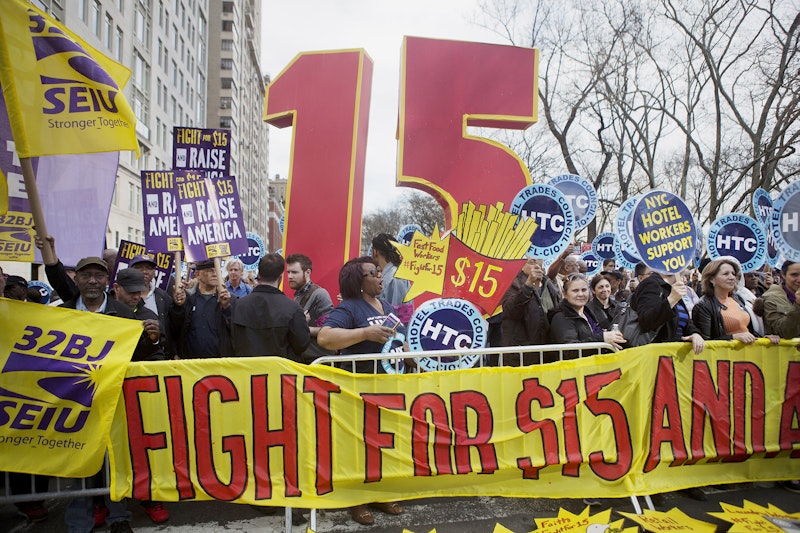A group of Republican Senators put forth an interesting bill. It’d gradually increase the federal minimum wage from $7.25 per hour, where it’s been stuck since 2009, to $11 an hour over four years. It’d have a slower implementation time for small businesses and index the minimum wage to inflation every two years. U.S. Sens. Shelley Moore Capito, Mitt Romney, Bill Cassidy, Susan Collins, and J.D. Vance introduced the proposal.
Additionally, the bill would enact mandatory E-Verify nationwide, requiring employers to run prospective workers through a national database to ensure they can legally work in the United States; the system exists to deter hiring illegal immigrants. It won’t become law, but there’s much to like. Every year the minimum wage stays the same, it effectively decreases. In 2009, $7.25 had far more purchasing power than now. If the minimum wage kept pace with inflation, it would be $10.30 per hour, meaning that, even if this proposal became law this year, the federal minimum wage would likely have less purchasing power at $11 an hour in 2027 than it did at $7.25 in 2009.
The stagnant minimum wage decreased under presidents Barack Obama and Donald Trump and continues to shrink under Joe Biden, even though he claims to support a higher wage. In February 2021, a $15-an-hour minimum wage proposal predictably failed in the Senate, with eight Democrats joining every Republican. Since then, the Biden administration hasn’t made a serious effort to raise the wage. It was an easy talking point during the 2020 presidential election season—taken from Bernie Sanders—but it’s not something Biden talks about anymore.
Meanwhile, Sanders, Sen. Elizabeth Warren, and others have moved on to supporting a $17 hourly minimum wage or higher. It’s a great form of virtue-signaling because there’s no hope of that getting done federally, and the lawmakers aren’t organizing referenda in their respective states, even though it would likely pass. I’d vote for it in a Massachusetts referendum as the state has shown it can handle having a $15 hourly minimum wage, the cost of living in the Boston metro area is insane, and increased pay for workers reduces welfare costs for taxpayers. Yet, Massachusetts is not reflective of the entire country, and a $17 hourly minimum wage would likely be a job killer in poorer parts of the country while, admittedly, benefitting some workers.
The E-Verify proposal would also likely boost wages in some sectors, though it’s hard to see that becoming law. The agriculture lobby opposes it, as do people who hire cheap labor at their resorts, like Trump. Cato Institute also argues that it’s not as effective as advocates claim, preventing 46 percent of illegal hires. Even if that Koch-funded propaganda stat is correct, that’s better than nothing. Also, E-Verify reduced the illegal immigrant population of Arizona by 17 percent when implemented, according to the same report.
Since supply and demand exists in the labor pool, and there are countless examples exist of labor shortages resulting in higher wages for workers, especially in resort towns across the country, a tight labor pool benefits the people. Meanwhile, flooding the labor pool with cheap labor depresses wages—one of the reasons why workers may oppose occupational licensing reform or reducing other barriers to entry in their respective fields.
The bill suffers from two problems. One is that many Republicans oppose minimum wage increases, as do their pro-business donors. Republicans are more likely to say something like the real minimum wage is zero—ironic words from a party founded on opposition to slavery. Additionally, nearly all Democrats oppose E-Verify, as do Republicans who take money from Big Ag or hold libertarian views on immigration. Democratic politicians are more likely to vote for in-state tuition and driver's licenses for illegal immigrants and to make their communities sanctuary cities and states than they are to do anything that seriously deters illegal immigration.
While an $11 hourly wage could get somewhere near 60 votes in the U.S. Senate if Democrats made a deal with Republican Senators, E-Verify is likely a non-starter. If Congress wants to boost wages for low earners, agreeing on this number could be the way to do it. Even so, it’s hard to imagine the Kevin McCarthy-controlled U.S. House taking any proposal up for a vote, even though he’s complained about the $174,000 salary that members of Congress make.
Don’t expect the federal government to boost the minimum wage soon. Although doing so would help people, states are better positioned to increase wages for their lowest earners. At least at the state level, political advocacy groups can organize ballot questions and ask the people directly: do you want a minimum wage increase? Recently, they’ve almost always said yes.

